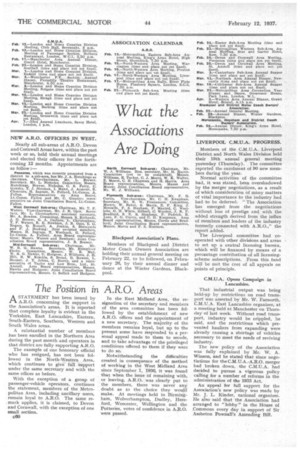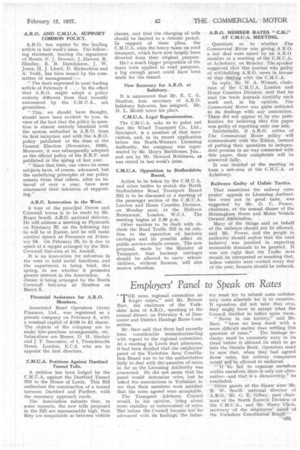What the Associations Are Doing
Page 110

Page 111

If you've noticed an error in this article please click here to report it so we can fix it.
Blackpool Association's Plans.
Members of Blackpool and District Motor Coach Owners Association are holding their annual general meeting on February 22, to be followed, on Februnary 26, by their annual dinner and dance at the Winter Gardens, Blackpool. LPVERPOOL C.M.U.A. PROGRESS.
Members of the C.M.U.A. Liverpool District and North Wales Division held their 19th annual general meeting yesterday (Thursday). The committee reported the enrolment of 90 new members during the year.
Normal activities of the committee had, it was stated, been overshadowed by the merger negotiations, as a result of which consideration of many matters of vital importance to the industry had had to be deferred. "The Association has emerged, from the negotiations without loss of prestige and with the added strength derived from the influx of members and leaders of the industry formerly connected with A.R.O.," the report added.
The Liverpool committee had cooperated with other divisions and areas to set up a central licensing bureau, which will be financed by means of a percentage contribution of all licensingscheme subscriptions. From this fund will be met the cost of all appeals on points of principle.
C.M.U.A. Opens Campaign in Lancashire.
That industrial output was being held-up by restrictions on road transport was asserted by Mr. W. Farnorth, C.M.U.A. East Lancashire organizer, at a meeting held at Manchester on Thursday of last week. Without road transport, industry would be crippled, lie said, and the restrictions which prevented hauliers from expanding were already causing a shortage of vehicles necessary to meet the needs of reviving industry.
The new policy of the Association was fully explained by Mr. W. A. Winson, and he stated that since negotiations for the C.M.U.A.-A.R.O. merger had broken down, the C.M.U.A. had decided to pursue a vigorous policy calling for a number of reforms in the administration of the 1933 Act.
An appeal for full support for the Association's new policy was made by Mr. J. L. Kinder, national organizer. He also said that "the Association had arranged to "lobby" in the House of Commons every day in support of Sir Assheton Pownall's Amending Bill. A.R.O. AND C.M.U.A.SUPPORT COMMON POLICY.
A.R.O. has replied to the leading article in last week's issue. The following statement, bearing the signatures of Messrs. F. J_ Downer, J. Havers; R. Hindley, E. B. Hutchinson, J. W. Jones, H. J. Lloyd, D. Richardson and A. Todd, has been issued by the committee of management:— " The fears expressed in your leading article of February 5 . . . to the effect that A.R.O. might adopt a policy entirely different from that recently announced by the C.M =D.A., are groundless.
"This, we should have thought, should have been evident to you, in view of the fact that the policy in question is almost entirely identical with the system embodied in A.R.O. from its first inception and with the A.R.O. policy published at the time of the General Election (November, 1935). Moreover, it was subsequently adopted as the official policy of the B.R.F. and published in the spring of last year.
" Since that time, our views on some subjects have, of course, advanced, but the underlying principles of our policy remain those that others, after an interval of over a year, have now announced their intention of supporting."
A.R.O. Innovation in the West.
A' tour of the principal Devon and Cornwall towns is to be made by Mr. Roger Sewill, A.R.O. national director. He will address a meeting at Plymouth on February 22, on the following day he will be at Exeter, and he will make another speech at Penzance on Febru • ary 24. On February 25, he is due to speak at a supper arranged by the MidCornwall Sub-area at St. Austell.
It is an innovation for sub-areas in the west to hold social functions, and the experiment is being tried, this spring, to see whether it promotes greater interest in the Association. A dinner is being arranged by the North Cornwall Sub-area at Stratton on March 5, Financial Assistance for A.R.O. Members. • Associated Road Operators (Area) Finances, Ltd., was registered as a private company on February 5, with a nominal capital of 2100 in £1 shares. The objects of the company are to .make hire-purchase arrangements, etc. Subscribers are Messrs. D. H. Sinclair and J. F. Seacombe, of 1, Threadneedle Street, London, E.C.2, who are to appoint the first directors.
C.M.U.A. Petitions Against Dartford Tunnel Tolls.
A petition has been lodged by the C.M.U.A. against the Dartford Tunnel Bill in the House of Lord& This Bill authorizes the construction of a tunnel between Dartford and Purfleet, with the necessary approach roads.
The Association submits that,' in some respects, the new tolls proposed in the Bill are unreasonably high, that they are inequitable as between vehicle classes, and that the charging of tolls should be limited to a definite period. In support of these pleas, the C.M.U.A, cites the heavy taxes on road transport, which have now largely been diverted from their original purpose.
Had a much bigger proportion of the taxes been applied to road purposes, a big enough grant could have been made for the tunnel.
New Secretary for A.R.O. at Salisbury.
It is announced that Mr. E. C. G. Heather, hon. secretary of A.R.O. Salisbury Sub-area, has resigned. Mr. D. L. Mould takes his place.
C.M.U.A. Legal Representation.
The C.M.U.A. asks us to point out that the Wharf Transport Co., Ltd., Stock-port, is a member of that Association, and, in its recent application before the North-Western Licensing Authority, the company was represented by Mr. Henry Backhouse, Jun., and not by Mr. Howard Robinson, as was stated in last week's issue.
C.M.U.A. Opposition to Staffordshire
Board.
Action to be taken by the C.M.U.A. and other bodies to scotch the North Staffordshire Road Transport Board Bill is to be discussed at a meeting of the passenger section of the C.M.U.A. London and Home Counties Division, on Monday next, at the Holborn Restaurant, London, W.C.1. The meeting begins at 2.30 p.m.
Other matters to be dealt with include the Road Traffic Bill in its relation to the operation of hackney carriages and its possible effect on public service-vehicle owners. The new proposal, made by the Minister of Transport, that hackney carriages should be allowed to carry schoolchildren, without licences, will also receive attention. A.R.O. MEMBER RATES " C.M." AT C.M.U.A. MEETING.
Questions as to whether The Commercial Motor was giving A.R.O. a fair deal were asked by an A.R.O member at a meeting of the C.M.U.A. at Aylesbury, on Monday. The speaker suggested that this 'journal was guilty of withholding A.R.O. news in favour of that dealiag with the C.M.U.A.
In reply, Mr. W. A. Winson, chairman of the C.M.U.A. London and Home Counties Division, said that he read the trade journals Carefully each week and, in his opinion, The Commercial Motor was quite unbiased in its dealings with any aSsociation. -There did not appear to be any justification for believing that this paper was guilty of reporting only one side.
Incidentally, if A.R.O. critics of The Commercial Motor policy will communicate with the Editor, instead of putting their questions to independent persons in no way connected with this paper, their complaints will be answered fully.
It was decided at the meeting to form a sub-area of the C.M.U.A. at Aylesbury.
Railways Guilty of Unfair Tactics.
That sometimes the railway companies' appeals to Licensing AuthoritieS were not in good taste, was suggested by Mr. 0. C. Power, chairman, at the annual dinner of the Birmingham Horse and Motor Vehicle Owners Asiociation.
Many of the things said on behalf of the railways should not be allowed, said Mr. Power, and the people in authority should realize that the road industry was justified in expecting reasonable demands to be granted. It was not right that the Traffic Acts should be interpreted as meaning that, unless vehicles were worked every day of the year, licences should be reduced.




























































































































































